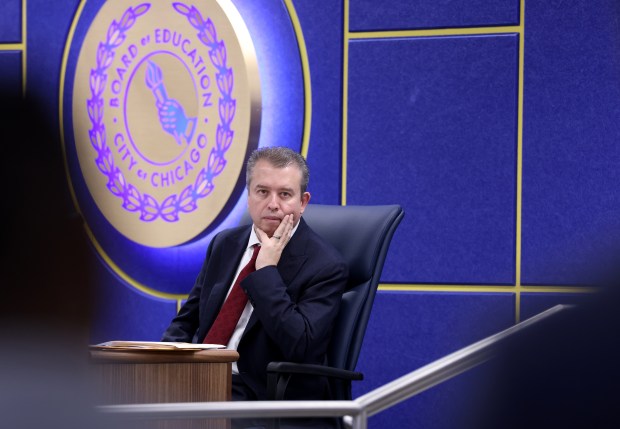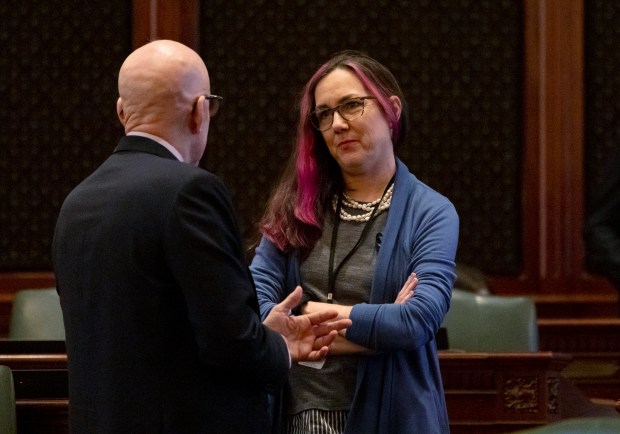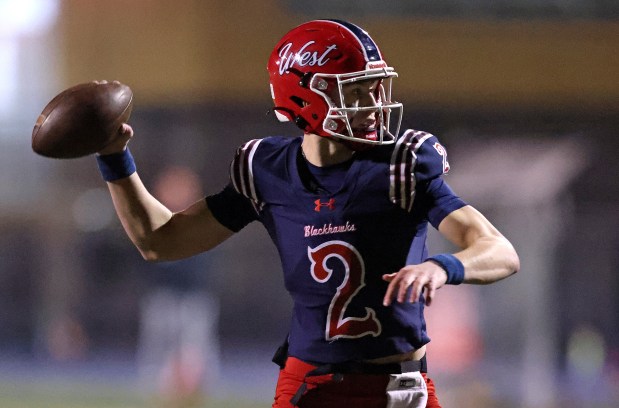Chicago Teachers Union educators voted on a final proposed contract deal with the school district Monday, capping off months of contentious negotiations and leadership conflicts that threatened to destabilize the nation’s fourth-largest district.
The road to a tentative agreement — which could still fall through — has seen almost a year of false starts and mounting pressures over how the district will afford both the teachers contract and a $175 million pension payment for nonteaching staff that’s at the center of a game of political football between City Hall and Chicago Public Schools.
Per protocol, a bargaining team of over a dozen teachers will look at the proposal package and decide if they recommend it. The proposals then move to the union’s executive board to be finalized as a tentative agreement, approved by the CTU House of Delegates on Wednesday.
The final vote from union membership will likely occur next week. CPS chief Pedro Martinez will present the deal to the Chicago Board of Education after that for final approval.
“The pending contract … recognizes the significant contributions of our educators, reflects the district’s budgetary constraints and fiduciary responsibilities, and avoids a strike for the first time in more than a decade,” the district wrote in the statement.
The union did not immediately respond to a request for comment Monday afternoon about whether the bargaining team approved the pending contract.
The proposals span from 4% raises to $10 million extra for sports and enforceable class-size limits. There are proposals to double bilingual teachers, reaffirm sanctuary protections and create safe spaces for LGBTQ+ students.
That a contract appears on the horizon saves Mayor Brandon Johnson and his close ally, CTU President Stacy Davis Gates, from the ire of CPS families and teachers as fears of a strike began to stir the last couple of weeks.
But political damage has been done, with the mayor expending enormous political capital and facing several setbacks to get to this point.
Johnson has shot back at naysayers by insinuating he is held to a different standard as a Black mayor, one who still retains control over the school board until it transitions into a fully elected body in 2027. But he has nonetheless stumbled on how to wield that power as lame-duck CEO Martinez sought to thwart his maneuvering over the fate of the district’s finances.
Though it is unclear what Johnson and Martinez’s next moves will be, one thing is certain: All parties must hammer out a plan to pay for the four-year CTU contract.
The mayor’s office did not immediately provide comment Monday afternoon. But at a Sunday event, Johnson took an early victory lap.
“Look, I’m careful not to say something too soon, but we’re really close, you all, for the first time in 15 years to get a teachers contract without a strike or a strike vote,” Johnson said at an unrelated event at a Far South Side church.
“When I was running for office, they said it would be a liability. But it sounds like to me that no other mayor could have brought Chicago Public Schools, the Board of Education, the mayor’s office and the CTU together to the table to make sure that our children get exactly what they deserve, which is a fully funded, well-rounded education.”
The final school board vote could be imperiled if Johnson’s allies in the body tie it to CPS reimbursing the city for the $175 million pension payment. Martinez has said there is enough remaining money for the contract, but not for both the union’s new proposal and the pension reimbursement.
But for now, the tentative deal marks an end to a dramatic sequence of labor negotiations that stretched from the bargaining table to the November ballot box and even landed in a Cook County courtroom as Johnson, Martinez and Davis Gates jostled for control over the deal.
As the dust settles, the mayor finds himself in a vulnerable position politically after weathering months of criticism from progressive allies and moderate opponents alike that his primary loyalty is to the CTU, not Chicago taxpayers or CPS families.
The progressive labor juggernaut was the biggest financier of Johnson’s 2023 mayoral bid, with about $5.4 million from CTU and its affiliates pouring into his campaign leading up to the April runoff. That hotly contested race saw Johnson, a former CTU organizer, counter constant attacks that he would be beholden to the teachers union by seeking to make the case that he would usher in a new era of labor peace.
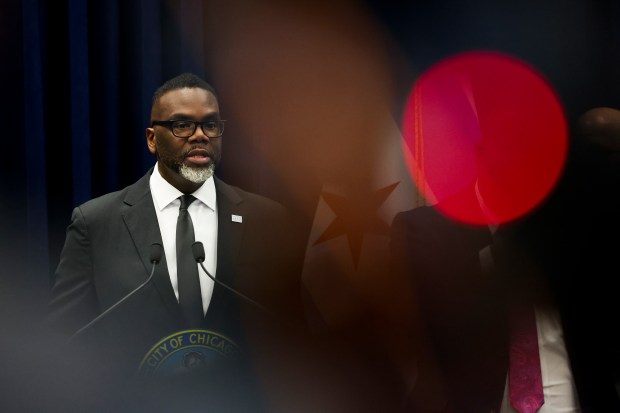
“Who better to deliver bad news to a friend than a friend?” Johnson said during one runoff debate.
That did not come to pass.
To some adversaries, the last several months have cemented the impression that Johnson remains in lockstep with the CTU as he bucked disapproval over his attempts to push out Martinez and what they said would be runaway spending for the teachers contract and other costs in the district.
Still, the mayor avoided a teachers’ strike, unlike his two predecessors, and is now on the brink of heading into the second half of his term with a deal he can bring back to his staunchest champions in the labor movement. He also did so without the federal COVID-19 stimulus funding that benefited Mayor Lori Lightfoot.
Whether Johnson’s process to get here will be worth souring some of his relationships in City Council and Springfield remains to be seen. Davis Gates, who is gearing up for her own reelection in May, can likely tout this accomplishment as proof her protracted efforts to install an ally on the fifth floor of City Hall have paid off.
The political blows Johnson incurred in the process include Martinez spurning his attempts to oust him in September. That impasse was followed by the remarkable scene of the mayor’s first handpicked Board of Education resigning en masse the next month rather than fire the CEO. In another troubling sign, 41 out of 50 aldermen signed a letter condemning Johnson’s jockeying over the school district’s finances.
The schools chief was finally let go by Johnson’s second-appointed school board in December, but without cause, engendering the unusual dynamic of Martinez staying on the job until his lame duck period ends in June. Along the way, Martinez has consistently attempted to thwart Johnson’s CPS agenda.
Martinez, a holdover from Lightfoot’s administration, sued the school board shortly after his firing, alleging that Johnson’s appointees were obstructing his duties as CEO. That lawsuit is pending.
Political whiplash
The target on Martinez’s back emerged in July when the CEO — and Johnson’s first school board — refused to account for the $175 million pension payment in CPS’ 2025 budget or take a loan to cover that cost along with the upcoming teachers’ raises, against Johnson’s wishes.
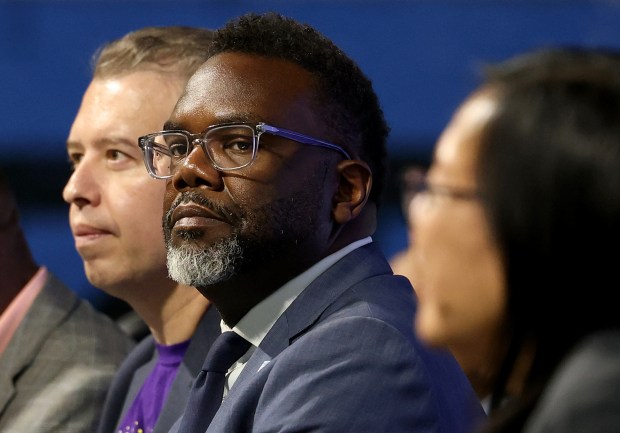
As the whiplash over Martinez’s employment and the churn in Johnson’s Board of Education unfurled, the mayor’s plans to find money for the CTU contract and pension payment, known as the Municipal Employees’ Annuity and Benefit Fund, lagged. That was complicated further once Johnson lost full mayoral control of the board.
In January, the school board shifted into a hybrid model under a landmark Springfield bill that passed in 2021. That means for the next two years, Johnson retains 11 out of 21 appointments in the school board, with the rest of the seats occupied by members elected in November. The body transitions to a fully elected board in 2027.
Although Johnson retains a majority of the board right now, budget amendments require two-thirds support to pass, and lackluster showings in the first school board races as well as two CTU-endorsed members flipping on his latest plan to issue $242 million in debt meant he could not get over that hump.
On March 20, the mayor’s appointed school board president, Sean Harden, pulled a budget amendment vote at the last minute when it became clear they could not get the votes for the controversial borrowing plan. The retreat was emblematic of how, during the waning days of mayoral control over CPS, Johnson is losing support from even once-friendly school board members.
The city covered the $175 million pension cost in its 2024 budget, with the expectation that the district would pay it back by a March 30 deadline to balance the city’s books. Without it, the mayor’s team had suggested it might have to draw from its reserves to reconcile the difference, but Johnson officials have stressed the final shortfall will not be clear until later this spring.
By law, the city has been responsible for making the MEABF payments. That only changed in 2020, when Lightfoot, in an effort to detangle district finances from the city as it transitioned to an elected board, forged an agreement that would shift some costs onto CPS. The district made its first payment to the fund in 2021, and future payments were supposed to gradually rise to more than $250 million.
Meanwhile, contract negotiations drove a wedge between CTU and the Service Employees International Union, jeopardizing one of the city’s most powerful labor alliances. The rift stems from a proposal that SEIU Local 73 said would have led to its special education teachers assistant positions being absorbed by CTU.
SEIU threatened to sue over the dispute and even passed a resolution in February declaring itself “under attack” by CTU. The battle culminated in a fiery back-and-forth between the heads of both unions last Monday [3/24], with SEIU 73 President Dian Palmer accusing Davis Gates of “bullying and dishonesty” after the latter denied allegations that she recently told another SEIU leader: “Y’all ain’t s— and you ain’t s—.”
The contentious proposal was dropped last week, but it remains to be seen whether the tension between the two formerly friendly unions will dissipate.
SEIU was the second-biggest backer of Johnson’s mayoral bid; his road to victory in 2023 was buoyed by those two labor groups, and a permanent fallout could prove consequential for his reelection chances.
When the CTU contract expired last spring, few expected the process to get to a tentative deal to be this fraught. Bargaining officially kicked off April 16, 2024, when the teachers union submitted 748 proposals to CPS. For many months, CTU didn’t back down from its demands.
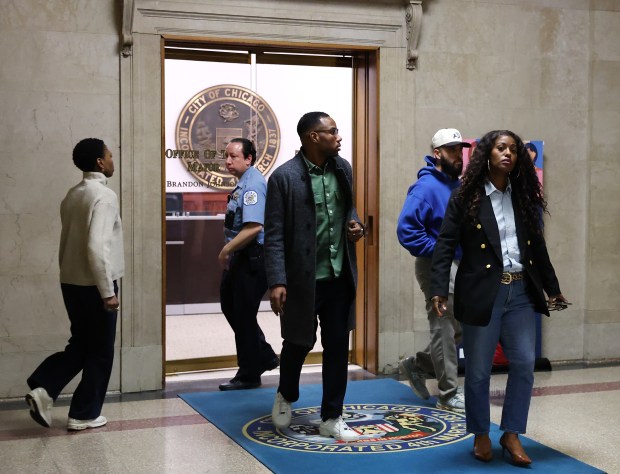
Davis Gates blamed Martinez for stalling progress, at various points nicknaming him the “Supreme Being” and holding a flurry of news conferences to lay blame on him.
On March 20, Harden requested Johnson call a special meeting with Davis Gates, Martinez and other city officials to come to an agreement on the contract. Though Johnson expressed confidence a deal could be reached “tonight,” Davis Gates told reporters afterward that an insolent Martinez “stormed out of the room” and likened his behavior to a 2-year-old’s.
At that point, the CTU proposals still left on the table were broken down from hundreds to just three: extra preparatory time in the elementary school day, raises for veteran teachers and evaluations. In a last-ditch effort last Wednesday, union organizers stood outside a building in the Loop and asked if they could speak to Martinez’s boss.
“Our president has asked directly to Pedro if they can meet and get this thing done,” Hilario Dominguez, CTU’s deputy political director, said. “Pedro said no.”
But Martinez told a different story in an email to top staff Thursday morning: “Please have an update ready for the full Board to be sent today once we can confirm that we have a tentative agreement with the details that were agreed upon last night.”
In another twist, he wrote that he expected Harden to call a special board meeting Monday to push for borrowing, “stating it is needed to support negotiations.”
Martinez retorted that “we need to be clear … to our staff and families what the facts are,” all but assuring the battle over the mayor’s CPS borrowing plan will continue.


